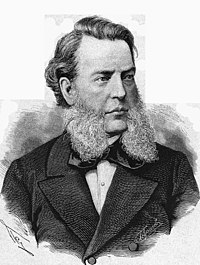Stepan Gedeonov
| Stepan Gedeonov | |
|---|---|

|
|
| Born |
Степан Александрович Гедеонов June 13, 1816 Saint Petersburg, Russian Empire |
| Died | September 27, 1878 (aged 62) Saint Petersburg, Russian Empire |
| Occupation | historian, art and theatre critic |
| Awards | Uvarov Prize (1876) |
Stepan Alexandrovich Gedeonov (Russian: Степан Александрович Гедеонов, 13 June 1816, Saint Petersburg, Imperial Russia—17 September 1878, Saint Petersburg, Imperial Russia) was a Russian art scholar, playwright, critic and historian, the director of the Hermitage Museum (in 1863-1878) and Russian Imperial Theatres, in 1867—1875.
In 1863 Gedeonov was elected the honourable member of the Saint Petersburg Academy of Sciences. As a historian, he is best known for his 1876 anti-Normanist 2-volume magnum opus Varangians and Rus (Варяги и Русь) which won him the Uvarov Prize of that year.
Reportedly not keen on the Russian drama, Gedeonov (as the head of the Imperial Theatres) did little to foster its development. He strongly supported, though, Italian opera and was instrumental in getting several prominent Italian singers to perform in the Russian capital.
Gedeonov had at least one musical project of his own, Mlada, originally envisioned as a ballet to be composed by Alexander Serov. After the latter's death, the idea was revised in 1872 as a 4-act opera-ballet, with a libretto by Viktor Krylov. The composition of the score was divided between César Cui, Modest Mussorgsky, Nikolai Rimsky-Korsakov and Alexander Borodin. The project was never completed, Ludwig Minkus came up with a ballet of the same name which was produced by Marius Petipa in Saint Petersburg in 1879. Later Rimsky-Korsakov revived the original idea and wrote his own ballet-opera Mlada, premiered in 1892.
...
Wikipedia
